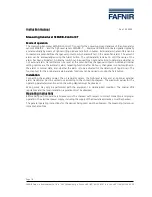
The transducer must be in clean (non-turbulent) water for
optimal performance.
• On single-drive boats, the transducer must not be mounted in
the path of the propeller.
The transducer can cause cavitation that can degrade the
performance of the boat and damage the propeller.
• On twin-drive boats, the transducer should be mounted
between the drives, if possible.
• Mount the transducer cable cover well above the water line
.
• Apply marine sealant to all screw threads to prevent water
from seeping into the transom .
• This transducer has an integrated spray guard, but if your
transducer throws an excessive amount of water spray,
recheck these mounting considerations and adjust the
position of the transducer as needed to eliminate the spray.
Assembling the Transducer with a Transom Mount
Bracket
1
Attach the mount to the transducer with the included
star washers , and screws .
2
Attach the mount to the bracket with the bolt , flat
washer , rubber washer , and lock nut .
NOTE:
The bolt should be tight enough to hold the
transducer in place when the boat moves at high speed, but
loose enough to allow the transducer to pivot out of the way if
the transducer hits an obstruction.
Installing the Transom-Mount Hardware
NOTICE
If you are mounting the bracket on fiberglass with screws, it is
recommended to use a countersink bit to drill a clearance
counterbore through only the top gel-coat layer. This will help to
avoid cracking in the gel-coat layer when the screws are
tightened.
The cables connected to the transducer should not be cut,
because cutting the transducer cables voids your warranty.
1
Choose an installation location on the transom (
).
2
Cut out the template.
3
With the template aligned vertically on the transom at the
installation location (
Mounting Location Considerations
), place the bottom corner of the template on the
edge of the transom.
4
Mark the center location of the two holes of the template.
5
Remove the template from the transom.
6
Wrap a piece of tape around a 4 mm (
5
/
32
in.) bit at 18 mm
(
7
/
10
in.) from the point of the bit, to avoid drilling the pilot
holes too deep.
7
If you are installing the bracket on fiberglass, place a piece of
tape over the pilot-hole location to reduce cracking of the gel
coat.
8
Using the 4 mm (
5
/
32
in.) bit, drill the pilot holes approximately
18 mm (
7
/
10
in.) deep at the marked locations.
9
Apply marine sealant to the included 20 mm screws, and
attach the transducer assembly to the transom.
10
Route the cable under the transom mount cable hook.
11
If you must route the cable through the transom, choose a
pilot-hole location well above the waterline and mark it.
12
Place a cable clamp on the transducer cable, approximately
halfway between the transducer and the top of the transom or
the pass-through pilot hole.
13
Mark the pilot-hole location for the cable clamp, and using a
3.2 mm (
1
/
8
in.) bit, drill a pilot hole approximately 10 mm
(
3
/
8
in.) deep.
14
Apply marine sealant to the included 12 mm screw, and
attach the cable clamp to the transom.
15
If you marked a pilot hole in step 11, use a 25 mm (1 in.) drill
bit to drill a pass-through hole completely through the
transom.
16
Route the transducer cable to the chartplotter:
• If you are routing the cable using a pass-through hole,
push it through the pass-through hole, and install the
cable-entry cover (
Installing the Cable-Entry Cover
).
• If you are not routing the cable using a pass-through hole,
route the cable up and over the top of the transom.
You should avoid routing the cable close to electrical wires or
other sources of electrical interference.
Installing the Cable-Entry Cover
If you routed the cable through the transom after you installed
the transducer, you should install the cable-entry cover to keep
water from entering your boat.
2






















